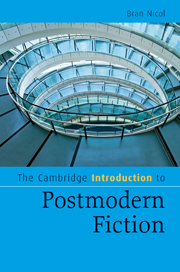Book contents
- Frontmatter
- Contents
- Acknowledgements
- Preface: reading postmodern fiction
- Introduction: postmodernism and postmodernity
- Chapter 1 Postmodern fiction: theory and practice
- Chapter 2 Early postmodern fiction: Beckett, Borges, and Burroughs
- Chapter 3 US metafiction: Coover, Barth, Nabokov, Vonnegut, Pynchon
- Chapter 4 The postmodern historical novel: Fowles, Barnes, Swift
- Chapter 5 Postmodern-postcolonial fiction
- Chapter 6 Postmodern fiction by women: Carter, Atwood, Acker
- Chapter 7 Two postmodern genres: cyberpunk and ‘metaphysical’ detective fiction
- Chapter 8 Fiction of the ‘postmodern condition’: Ballard, DeLillo, Ellis
- References
- Index
- Cambridge Introduction to …
Chapter 2 - Early postmodern fiction: Beckett, Borges, and Burroughs
Published online by Cambridge University Press: 05 June 2012
- Frontmatter
- Contents
- Acknowledgements
- Preface: reading postmodern fiction
- Introduction: postmodernism and postmodernity
- Chapter 1 Postmodern fiction: theory and practice
- Chapter 2 Early postmodern fiction: Beckett, Borges, and Burroughs
- Chapter 3 US metafiction: Coover, Barth, Nabokov, Vonnegut, Pynchon
- Chapter 4 The postmodern historical novel: Fowles, Barnes, Swift
- Chapter 5 Postmodern-postcolonial fiction
- Chapter 6 Postmodern fiction by women: Carter, Atwood, Acker
- Chapter 7 Two postmodern genres: cyberpunk and ‘metaphysical’ detective fiction
- Chapter 8 Fiction of the ‘postmodern condition’: Ballard, DeLillo, Ellis
- References
- Index
- Cambridge Introduction to …
Summary
While modernist fiction can be seen as the response to Ezra Pound's command to ‘make it new’, the major question for the early postmodern writers of the 1960s and 1970s – though they share the modernist conviction that realism as a fictional mode is largely invalid in the twentieth century – is simply how to keep on writing in the face of developments in newer artistic forms such as cinema and television, the increasingly ‘fictional’ quality of contemporary life, and also the strong sense that the novel is effectively exhausted as a literary form.
Exhaustion is the term used by the American postmodern novelist John Barth in one of the most important contributions to the postmodern debate, ‘The Literature of Exhaustion’ (1967), which views the contemporary novel as in decline. What he means by exhaustion is not some kind of ‘physical, moral, or intellectual decadence’ but simply the growing sense that ‘certain forms or…certain possibilities’ in fiction are ‘used up’ (Barth, 2002, 138).
Barth here is voicing an anxiety that beset a number of 1960s and 1970s writers: that it is impossible to say or do anything new in the novel following the achievements of modernism. The problem, he writes, is not a general weariness towards all-too familiar traditional art forms, for this could simply be overcome by producing gimmicky novels made up of other kinds of documents such as ‘Somebody-or-other's unbound, unpaginated, randomly assembled novel-in-a-box’ (a curious prediction of B. S. Johnson's experiment in his novel The Unfortunates, published two years after Barth's essay) or ‘printing Finnegan's Wake on a very long roller-towel’ (Barth, 2002, 139).
- Type
- Chapter
- Information
- The Cambridge Introduction to Postmodern Fiction , pp. 50 - 71Publisher: Cambridge University PressPrint publication year: 2009



